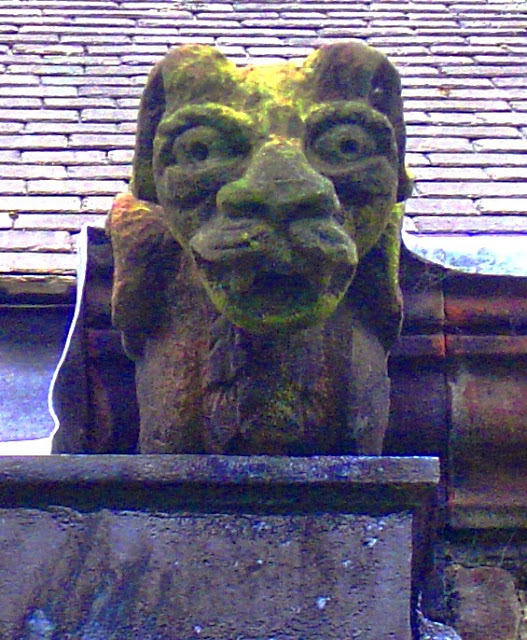Although I do not believe in God, or gods, I’ve always been impressed by the art and the craftsmanship that such a belief inspires, from the mediæval cathedrals of Europe to the paintings of such artists as Michelangelo, Caravaggio and Poussin. On a lesser scale, but hardly less impressive, is one of the five churches in my home town.
Christ Church in Penrith was built in 1850, originally as a chapel of ease, which is odd, given that the parish church is a mere 10 minutes walk away. Its architecture seems to have been influenced by the neo-Gothic style being championed by Augustus Pugin in the early Victorian period, which means that it has more interesting external features than the other four churches in town combined, although according to the Visit Cumbria website, noted architectural historian Nikolaus Pevsner described the church as ‘dull’. It is anything but.
Of note are the mouldings surrounding the doors and windows, each of which is terminated by a small carved head, many of which are men wearing crowns:
Some of the heads are decidedly non-regal, however, although it is difficult to judge from a casual inspection whether they were intended to represent scholars or artisans:
Some of the heads are of women, and where this happens the woman is always on the left, which I assume has something to do with right (dexter) having a higher status than left (sinister). In a real situation, the male partner would be on the woman’s right, so that he could have his sword hand free to protect her if attacked, but here he is on her left:
There is another question. All the heads are different, so it is legitimate to speculate whether the original stonemasons used models when creating these carvings, or whether they were the products of imagination. It is also reasonable to ask whether they were intended to represent real historical figures.
However, the church’s most fascinating feature is its gargoyles, the points along the eaves where rainwater from the roof is fed into drainpipes and thence into the sewers. My first thought is whether these fearsome creatures are products of the stonemason’s imagination or whether they represent the members of some mediæval bestiary, each of which has a name—Astaroth, say, or Moloch, or Beelzebub.
I have therefore included below photographs of all these monsters, starting at the near corner of the church in the first picture above and working anticlockwise. I have deliberately increased the colour saturation and cranked up the contrast for dramatic effect:
There is one other observation to make: dozens of people walk through the churchyard every day—it’s a convenient shortcut—but I suspect that few notice anything strange or unusual about the architecture, even though the through path takes one within a few feet of the church. This is a shame, because it would be easy, and rewarding, to spend an entire afternoon on a single circumnavigation of the church. I recommend it to visitors and Penrithians alike.
Friday, 27 September 2013
Subscribe to:
Post Comments (Atom)















I would not take this walk at night. I see demons. Beautiful nightmarish demons.
ReplyDeleteNor would I Bruce. I agree that they are beautiful though, in a nightmarish kind of way.
DeleteThat is anything but 'dull', Dennis. I fancy that those heads were modelled from real mend women. The placement of women to men is interesting, as reasoned by you -maybe those guys were left-handed. Do continue on the series.
ReplyDeleteI hadn’t planned to write anything more about the church Uma, especially as I’m off back to Hong Kong in about ten days, but I shall take a few more photos before I go, because I haven’t exhausted all the church’s interesting features.
DeleteThe gargoyles are actually kinda cute, especially #1 and #5.
ReplyDeleteThey are meant to be scary Kris, although with the two you mention I can almost imagine having them as pets.
DeleteDennis, these seem almost a parody of the traditional gargoyle figure. More designed to give the passerby a good laugh than scare.
ReplyDeleteDon’t forget that this is a nineteenth-century pastiche of the traditional gargoyle Marty. It wouldn’t surprise me if someone was having a laugh.
DeleteThere's a couple of those gargoyles look downright cuddly. The last one especially.
ReplyDeleteDoes that mean you’d like one as a pet Big D?
DeleteI would spend a lot of time there. I would also burn a lot of film (as we used to say). The colors and textures are awesome. It makes me wonder what the inside looks like.
ReplyDeleteI knew you’d like this one Pat. I wonder what the interior looks like too. In fact, I plan to obtain permission to photograph the inside, but I’ll have to wait until next year now, because I’m off back to Hong Kong next week.
Delete